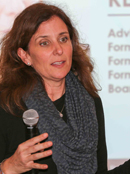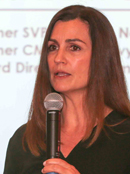When we examine the relationship between CMOs and boards, the numbers tell a daunting story: Only 17 CMOs sit on the boards of Fortune 1000 companies. These are long odds for any CMO hoping to be placed on a board, but they’re only part of the picture. As we learned at our fourth annual West Coast CMO Summit, there are ways for marketers to make their way onto boards, and indeed, there’s a growing sense that boards are moving toward a more marketing-friendly environment.
To discuss the connection between CMOs and boards, we brought three speakers with extensive marketing and board experience to speak to a crowd at San Francisco’s WeWork Embarcadero Center: Elisabeth Charles, former CMO of Old Navy, Athleta, and Petco, and board director with At Home; Kerry Cooper, former CMO of Walmart.com and ModCloth, and board director with BevMo!; and Cammie Dunaway, author of “Fit Matters: How to Love Your Job,” former CMO of Yahoo!, Nintendo and KidZania, and board director with Go Health, Planet Fitness and Red Robin. The group talked about their own experiences on boards, emphasized the importance of knowing digital and gave tips on getting selected to boards. Here are some of the takeaways from the discussion.
Visit our CMO Summit page for highlights from previous discussions.
Ask questions, don’t offer answers
At this summit, we asked our speakers to tell us their personal experiences, followed by a panel discussion to dig deeper into how their board work dovetails with their career. One point that came up repeatedly was the difference between a CMO’s role in his or her day job compared to a CMO’s position on a board.

“As a CMO, I was all about having really quick answers and opinions about any questions that were asked — I was about digging into details to ensure we had executional excellence, and I never hesitated to have rigorous debate with colleagues about strategy,” Dunaway said. “So I went into the boardroom with guns blazing.” After a few meetings, though, Dunaway recounted the advice she received from a veteran board member: “This director said, ‘What we need from you is not answers to these questions, but we need you to help us ask good questions. And we didn’t bring you on to analyze marketing execution. We brought you onto the board to think strategically about consumer behavior.'”
Cooper agreed, saying directors are responsible for taking a larger-view perspective rather than seeing matters through an operational lens. “You’re not an operator. Your job is not to fix things,” she said. “Your job is, ‘How do I ask good questions? How do I help the team come up with a different way of thinking?’”
Three words: Digital. Digital. Digital.
Given the pervasiveness of digital disruption, it’s crucial for a marketer to know about digital and how to integrate it into the company’s strategy. “The smart companies are saying, ‘We need people who are in sitting positions, who are out in the marketplace and who know the latest that’s happening in digital,’” Charles said. “Companies need someone who knows what’s happening with the Generation Z and millennial customers. They need to know, ‘How are they shopping differently? Who can bring that information to us?’”

As someone who should know digital, then, a marketer should raise issues that some board members weren’t considering, Cooper noted. “There's a whole different ballgame with examples like, ‘How is this going to work with mobile technology?’ Because sometimes you’ll raise the point that, for instance, this site isn’t mobile responsive, and they’ll say, ‘Wait — what’s that?’ And so my goal on the board is not to own the digital space, but to at least ask the questions of where are your priorities, how do we want to think about how we're going to address those questions.”
How to avoid groupthink
When boards convene, there can be an inclination toward reaching a harmonious consensus rather than uncomfortable disagreement. To find the right balance between conflict and consensus, Dunaway said it’s important that boards have a variety of perspectives. “In addition to gender diversity and multicultural diversity, I think there's also real room for style diversity,” she said. “While you want to make sure that the board respects one another and is collegial, it’s great when you have a balance between people who are more diplomatic and those who are constantly asking the really tough questions.” Along those lines, Dunaway noted that diplomacy is always important. “It’s key to be thoughtful about the way you word your questions. I've learned to try and say more of something like, ‘How could we improve our mobile experience?’ as opposed to, ‘Why is our mobile app so bad?’ which is the way we tend to talk in our management meetings.”
Tips on how to get on a board
 While aptitude, abilities and strategic insight are clearly important requirements for board placement, sometimes it just comes down to who you know. Charles described how some colleagues were extremely proactive in their pursuit of director positions, while others were more passive and still ended up on a board. “I've had friends who have been so diligent about it — they said, ‘I've created a special resume, and I've gone to these conferences and I've joined theboardlist.org,’” she said. “Then there are others who just network. In the end, you don't know where it's going to come from.” That said, Charles noted that it always helps to stay in touch and maintain good relations with colleagues. “There’s no secret formula, and it’s different for everybody. But sometimes even when there's not an opportunity, you can plant the seed with people and say, ‘I’d like to be on your board, here's what I can offer,’” she noted.
While aptitude, abilities and strategic insight are clearly important requirements for board placement, sometimes it just comes down to who you know. Charles described how some colleagues were extremely proactive in their pursuit of director positions, while others were more passive and still ended up on a board. “I've had friends who have been so diligent about it — they said, ‘I've created a special resume, and I've gone to these conferences and I've joined theboardlist.org,’” she said. “Then there are others who just network. In the end, you don't know where it's going to come from.” That said, Charles noted that it always helps to stay in touch and maintain good relations with colleagues. “There’s no secret formula, and it’s different for everybody. But sometimes even when there's not an opportunity, you can plant the seed with people and say, ‘I’d like to be on your board, here's what I can offer,’” she noted.
The minuses — and pluses — of being on a board
While board membership brings status (and remuneration), it’s not just a matter of showing up. For starters, being a director takes time and hard work. “There's a lot of responsibility, and you shouldn’t try to get on a board just to be on a board,” Charles said. “You need to love the company, the leadership, the business model, the culture. You're all in. Sometimes you have to turn down some really great opportunities because you might have to be out of the office 12 days a year just for that board. And that’s your vacation time, so you’d better love what you’re doing.”